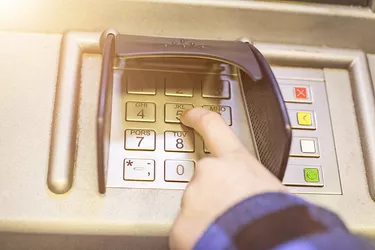Individual bank account customers can freeze their own checking accounts using one of a variety of banking holds. Typically, deposits continue to come in, but certain types of expenditures can be prevented.

Reasons to Place a Hold
If you suspect you are a victim of identity theft, or that your bank account information has been stolen, you should immediately place a hold on your account to prevent fraudulent purchases and orders from occurring. Thieves can also acquire your bank account information from a stolen wallet, lost debit card, or malware infecting your computer.
Video of the Day
Video of the Day
How to Hold Your Checking Account
When you determine that you should put a hold on your account, immediately call or visit your local bank branch and ask to speak with an account representative. He can advise you on your particular bank's policy. You only need to prove ownership of your account through the usual means, such as providing a Social Security number and address.
What a Hold Means
Placing a hold on your account is not the same as closing your account. There is no need to re-open an account with a new bank number. You can release the hold later and continue banking operations with that account as usual. Some banks call this "credit-only status," meaning deposits will still credit to your account. You might need to agree to cancel automatic payments and cease making withdrawals. Regular banking fees may still apply as well. If fraudulent activity is happening on your account, it is much simpler and cheaper for the bank to help you place a hold than it is to deal with lawyers and law enforcement activity later.
Your Bank’s Obligations
Your checking account belongs to you, and unless a creditor or other authorized party has placed an outside hold on your account, you have the right to determine whether or not your funds can be accessed.
Your bank is also subject to the Expedited Funds Availability Act, which is the law that determines how banks handle your incoming deposits. Under this law, banks must process incoming deposits within a certain number of days, allowing only reasonable holds for large or out-of-state checks.
How to ACH Block Your Account
If your debit card has been stolen or you suspect Internet fraud activity involving your account, you can ask for an Automated Clearing House hold that blocks only electronic and debit card transactions. With an ACH block in place, you can continue to write checks or physically withdraw cash at the bank. Call your bank and ask to speak to a representative about the process of getting an ACH block.
Closing the Account
If for some reason you need to close your account, you might see a continuation of automatic withdrawals, joint party activity and overdraft charges. When you ask to have your account closed, you should also request that a "hard hold" be placed on the account to prevent any further activity. Policies on this may vary from bank to bank. If you encounter resistance, ask to speak to a manager, who may be aware that putting a hard hold in place will save everyone, including the bank, time and headaches.